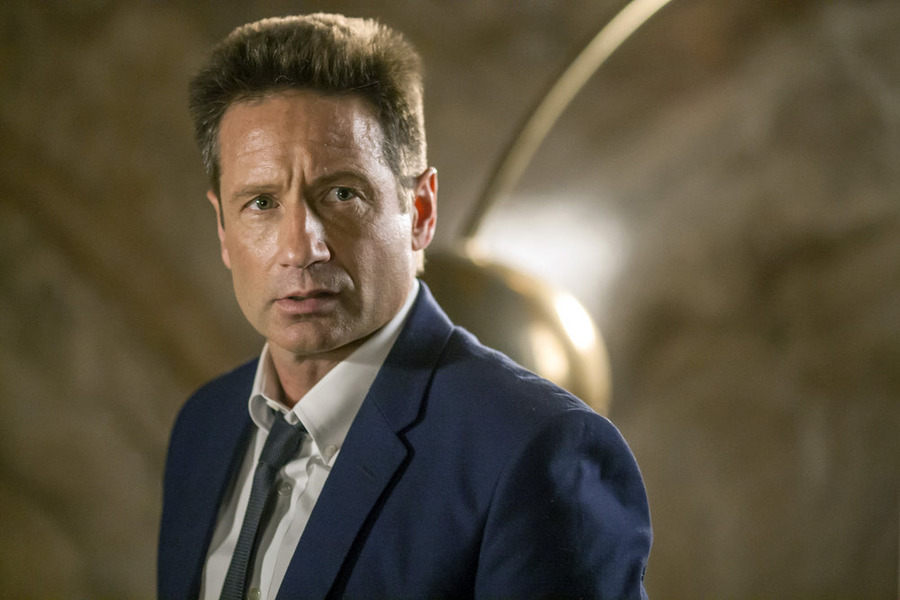You can’t say they’re not trying. Watching NBC’s “Aquarius”
and ABC’s “The Whispers,” one can feel the push on behalf of the networks to
keep up with cable and streaming services like Netflix. In fact, “Aquarius” is
a breakthrough show for NBC—it will be available in its entirety following its
series premiere this Thursday, May 28th, while also airing in a
traditional weekly format. Will it impact ratings? Ideally, the opposite would
happen—word-of-mouth from the binge viewing would spur interest in the weekly
broadcasts. The small problem there is that however one watches “Aquarius,” it’s
not that good. It’s a bizarre blend of styles and themes that uses nostalgia
instead of period realism. And it’s still more fun to watch “The Whispers”.
David Duchovny (“The X-Files”) returns to network TV in the
role of Sam Hodiak, a WWII vet in 1967 Los Angeles. As written, he’s the
old-fashioned cop, the one who thinks free love and copious drugs only lead to
crime. As played, he’s got a bit too much of that Duchovny swagger, never quite
selling the stuck-up vet that Hodiak needed to be for the culture clash to be
effective. 1967 California is like a candy store for screenwriters. Crime was
rising; barbers were going out of business; the Vietnam War was on everyone’s
mind; issues of racism and women’s rights were on the news every night—there are
so many social issues with which to play in this era that writers need to try
to cram it all in. To his credit, writer John McNamara uses most of it as
background, and the era is a fascinating one even if Duchovny doesn’t look like
he belongs in it.
Hodiak gets the case of his life when Emma Karn (Emma
Dumont) goes missing. She happens to be the 16-year-old daughter of Hodiak’s
ex-girlfriend, and so an ordinary runaway teen story becomes something urgent
for Hodiak to solve. He asks for the assistance of a young vice cop named Brian
Shafe (Grey Damon), who, of course, represents the new world to Hodiak’s old.
He’s all long hair, idealism, and personal freedom. Shafe will go undercover to
find Emma while Hodiak rolls his eyes at these crazy kids.
It’s revealed early that Emma has been quasi-kidnapped by
the one and only Charles Manson (Gethin Anthony). This is Manson in the years
before Tate-LaBianca—the wannabe musician who drew people to him with visions
of a free, new world. It is the cult leader version of Manson more than the
murderous psychopath we’ve seen on film before—although the dangerous aspect of
his worldview is never ignored.
On paper, “Aquarius” is an ambitious project. How did we get
from WWII veteran police officers like Hodiak to Manson to today? Manson’s
ascendance has often been paralleled with the end of the free-loving ‘60s. And
Anthony makes for a charismatic maniac. It’s the thinness of the filmmaking and
the unfocused narrative that frustrates. The music choices are a Time-Life
collection of the era (it’s seconds into the premiere before they go from “I
Can See For Miles” into “White Rabbit”) and when Manson assaults a store owner
to the tune of “Daydream Believer,” I had had just about enough. It might sound
like nitpicking but the soundtrack reflects a project in which there aren’t
enough surprises. And the show never quite feels like it knows its identity. Is
it mystery? Drama? Cultural commentary? All or none of the above? It was
certainly a daring pitch for NBC to take, and I respect them for doing so, but
it didn’t quite connect.

As flawed as I found “Aquarius,” it’s far better than ABC’s “The
Whispers,” debuting Monday night, June 1st. This is one of those odd
projects in which actors and actresses who have been great before come off
horrendously due to a script that does them no favors and filmmaking that is so
dull that we have nothing more to focus on than the bad acting.
The series opens with a cute little girl talking to her
imaginary friend. They’re playing a game. Said game requires mommy to stand on
a certain spot in their treehouse. The floorboards break and mommy goes
tumbling down. It turns out that a boy was recently killed after his imaginary
friend—with the same name—told him to do something dangerous. What is going on
with these kids? Are they in danger? Are all of our children in danger? And how
can we stop whatever or whoever is manipulating them to commit crimes? FBI
child specialist Claire Bennigan (Lily Rabe of “American Horror Story”) is
brought in to investigate.
Meanwhile, Wes Lawrence (Barry Sloane) is asked to assist in
finding a pilot (Milo Ventimiglia of “Heroes”) who has disappeared after a
particularly bizarre plane crash. It turns out the pilot was married to Claire,
who also slept with Wes. Why are these particular people going through such
unusual, supernatural occurrences? What does it mean for the fate of the world?
“The Whispers” goes through the motions in an effort to be a
new “Fringe” but it has no personality. Elements like design, atmosphere,
casting—the things that produce tension beyond concept—are absent. And Rabe is
a surprisingly ineffective lead, although it is mostly due to the horrendous
dialogue she’s been given. “The Whispers” is not what we typically see in
network Summer programming, and I commend ABC in trying something new in the
season, but, like “Aquarius,” the broadcast nets won’t compete with
high-concept offerings on cable and Netflix until they realize that it’s always
going to be the execution that matters most of all.













